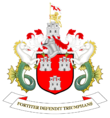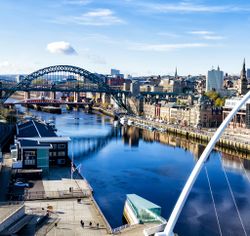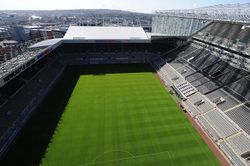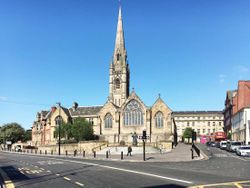Free City of Newcastle
Free City of Newcastle | |
|---|---|
| Kingdom of Northumbria | |
| Capital | Bamburgh (national) Newcastle upon Tyne (county) |
| Largest city | Newcastle upon Tyne |
| Official languages | English (British English, Northumbrian dialects) |
| Demonym(s) | Geordie, Novocastrian |
| Government | Metropolitan county in a unitary parliamentary constitutional monarchy |
• King of Northumbria | King of Northumbria |
• Prime Minister of Northumbria | Prime Minister of Northumbria |
• Mayor of Newcastle | Mayor of Newcastle |
| Legislature | Newcastle Council |
| Establishment | 24/11/2020 |
| Currency | Pound Sterling |
| Time zone | Northumbrian Standard Time |
Newcastle, or more properly the Free City of Newcastle is one of six counties within the Kingdom of Northumbria. It borders the counties of Northumberland to the north and east, Durham to the south and Hexhamshire to the west. Though the second smallest county, it possesses the third largest population, totaling 302,000 inhabitants. With Teesside it is one of two metropolitan counties in Northumbria.
History
Kingdom of Sorrenia
The city of Newcastle upon Tyne was first claimed by Northumbria's predecessor - the Kingdom of Sorrenia - during the 'Great Expansion', when the Sorrenian government greatly expanded the territorial claim of Sorrenia to encompass all of the North East, North Yorkshire and much of the North West. Though no Sorrenian citizens were inhabitants of Newcastle (or 'Geordies'), many did regularly visit the city, and Newcastle came to possess an important role in Sorrenian cultural and political life. At this time, Newcastle was a far larger area than the contemporary county, encompassing the entire Tyneside region.
Newcastle was one of the biggest sources of support for the left-wing Republican Party who dominated elections in Gateshead, East and West Newcastle, North Tyneside and South Tyneside. Meanwhile, the liberal NDLP won seats in central Newcastle and the northern constituencies which were dominated by more affluent university-educated populations.
At the time, Newcastle was Sorrenia's second-largest city, behind the city of Leeds in Yorkshire.
Kingdom of Northumbria
With Northumbria's abandonment of Sorrneia's claims in Yorkshire and the North West, Newcastle became its largest city by some margin, contributing further to its political and cultural sway. In keeping with Newcastle upon Tyne's history as a corporate county independent of the English county of Northumberland (since 1400), Newcastle was declared a 'free city', and granted a number of additional devolved powers compared to Northumbria's other counties. Furthermore, though Northumbria's ceremonial capital is the small village of Bamburgh (the historic capital of the Anglo-Saxon kingdom), most key government institutions like the Parliament and the Witan are located in Newcastle, granting it a central role in Northumbria's politics.
Government
Newcastle's head of state is the Mayor of Newcastle, elected directly by the population of Newcastle every general election. Newcastle's legislature is a county council appropriately called Newcastle Council, and is of intermediate size with twenty-one members, all elected during a general election.
The Mayor of Newcastle, as head of state of Newcastle, is entitled to appoint three members to the Witan, the upper chamber of Northumbria's legislature. Newcastle operates a catch-all system, meaning all of the Mayor's appointees are traditionally from their own party
Political parties
Newcastle is one of the more politically contested counties in Northumbria. The Socialist Party perform best in the working-class areas of Byker and Ouseburn and the West End of Newcastle. Meanwhile, the Liberal-Green Alliance perform best in central Newcastle and Jesmond which together constitute a sizeable section of the party's base of support. The National Democratic Party tend to win constituencies in the more affluent suburbs in places like Gosforth. Several of Newcastle's constituencies overlap these areas of support, meaning a large proportion of them are contested seats.
Geography
Newcastle is part of one contiguous urban area called Tyneside, which runs from the West End of Newcastle to Tynemouth and South Shields in the east, straddling the Tyne River. In turn, Tyneside connects to the urban area of Wearside, which includes the city of Sunderland (with whom Newcastle has a fierce rivalry).
Much of the city retains a medieval street layout, with narrow 'chares' and medieval buildings like the Castle after which the city is named. Much of the city also boasts an extensive array of neoclassical architecture for which the city is known. The city also possesses large open green spaces; most notably Leazes Park by St James' Park, the Ouseburn Valley and the Town Moor which is around 1000 acres in size.
Economy
Traditionally, Newcastle played a leading and pivotal role in the Industrial Revolution. It was a centre for coal mining sourced from the surrounding area, which supplied shipbuilding, engineering, munitions production and manufacturing. At the same time, Newcastle became a hub for invention - Joseph Swan invented an early version of the incandescent light bulb in Gateshead, and the modern lifeboat was also first created in Newcastle.
By the second half of the 20th century, Newcastle's heavy industries began to decline, and were replaced by office, service and retail employment. The nearby Team Valley trading estate and Metrocentre employ many thousands of people from Newcastle. The city itself has also developed a large retail sector, including the historic Grainger Market and the recently refurbished Eldon Square Shopping Centre.
The city is also one of Britain's largest educational and cultural hubs. Its two universities - Newcastle University and Northumbria University - have a combined student population of over 56,000, and the former is a member of the prestigious Russell Group. The UK's first biotechnology village - the Centre for Life - was opened in Newcastle in 2000, which helped to further solidify Newcastle's new-found role as a science city.
Culture
Newcastle is world renowned for a number of cultural elements. Its football team - Newcastle United F.C. - regularly contends in the Premier League and is famous throughout the world. It is also one half of the Tyne-Wear derby against Sunderland A.F.C. The city is also widely acclaimed for its nightlife, and in particular its nightclubbing scene. Its architecture is also unique and noteworthy, boasting a large set of neoclassical architecture in the city centre. Famous buildings include the Millennium Bridge and the Tyne Bride on the Quayside, St James' Park stadium, Grey's Monument and Newcastle Central Station. Newcastle is also home to one of just five Chinatowns in England, and correspondingly hosts a wide array of East Asian cuisine.
Historically, the city was an epicentre for theatre and literature, and the city continues to possess a number of famous theatres such as the Theatre Royal. Its music scene is also respectable, with artists such as Dire Straits, Sting and The Animals all hailing from the area. Today, venues like the O2 Academy and the Metro Radio Arena regularly host world-leading musical talent.
Newcastle and its inhabitants - Geordies - are well known in the United Kingdom for being friendly and welcoming, as well as for their distinctive accent. This is one notable reason for Newcastle's large call centre industry.
Gallery
-
Newcastle Quayside -
St James' Park -
St Mary's Catholic Cathedral




